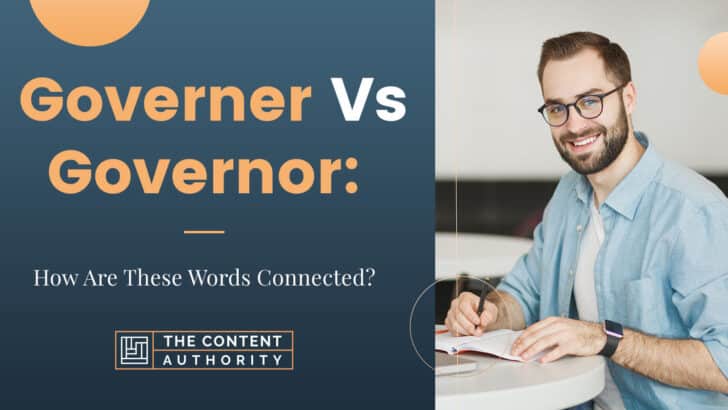Governer vs governor: do you know the difference between these words? One of the spellings is incorrect. We’ll let you know which one it is in this article.
A governor is a chief executive officer of a county or provincial-level division of a country. This noun also means “member of a decision-making organization or entity similar or equivalent to a board of directors,” like in banking. In contrast, governer is a misspelling for governor.
We can all agree that English is sometimes complicated because of its grammar and spelling rules. If you have encountered confusing words like governer and governor, and want to know more about them, you are in the right place. This article will discuss these words’ meanings, connections, and usage in depth.

Definitions Of Governer And Governor
A definition is a statement of the meaning of a word or a group of words. Definitions help you understand more about a word. It also allows you to differentiate a word from other words. Therefore, we will start this post by discussing the meanings of governor and governer.
Definitions Of Governer
This is an incorrect word and a misspelling of “governor.” The word does not have a definition nor appears in any dictionary.
Definitions Of Governor
In Politics, a governor is the CEO of a county or provincial-level division of a country. This noun refers to an official appointed to govern a town or region. The informal definition of a governor is “a boss or employer.”
A governor is also “a civil servant with more governing and decision-making powers.” Governors operate at an executive level in the federal or sub-national government, heading a county or a state. A governor is elected or appointed.
In the US, a governor is an elected executive head of state. For example, every state in the US has an elected governor.
A more general definition is “the head of a public institution or a member of a governing body.” For example, the governor of a bank.
In the UK, a governor represents the British crown in a colony or a commonwealth state that considers the monarch the head of state.
Another definition is “a member of a decision-making committee for an organization or an entity, like a board of directors or a member of a board of governors.” For example, a board of governors.
A governor is someone acting as a guardian of a young man or a tutor to inform and facilitate several matters. This noun also means “a person governing or is invested with the supreme executive authority in a state.” A good example is a chief ruler or a magistrate.”
In engineering, governor refers to “a gadget fixed in a specific area of the water wheels, steam engines, and other machines to maintain a uniform or nearly uniform speed when resistance and motive forces are variable.” In simpler terms, a governor is “a control that maintains a machine’s steady speed.” Some nations have mandatory requirements to have speed governors installed in public vehicles.
How To Properly Use Governer And Governor In A Sentence
So, how do you use the word governer? This word does not exist. It is a misspelling. Therefore, there are no contexts where you can use this word in a sentence.
How To Use The Word Governor
The word governor is a noun. As a noun, use it in your contexts to mean:
- A person responsible for administrative duties in a government
- A person exercising over a place or people
- A device that limits a vehicle’s speed
- A person that enforces confinement in a prison
- A representative of a group
- A person overseeing civil and local operations
- Someone of great importance
Other word forms of the word “governor” are:
- Plural form – governors
- Verbs – govern, governmentalize, governorship, governed, governing, etc.
Governer Vs Governor: The Differences
The key difference between these words is that one word is correct while the other is not. The correct word is governor. Another difference between these words is their spellings—more differences below.
The History And Etymology
The term governor’s first known use was in the 13th century. It comes from the word “gouernour,” meaning “personal keeper, protector, or guide.” This word took on a new meaning in the 14th century from the Old French word “governeor,” meaning “prince, ruler, or an administrator.”
This word also has roots in the 11th century Modern French word “gouverneur,” a direct translation from the Latin “guvernatorem,” meaning “director, ruler, steersman, or pilot.” In the late 14th century, the meaning “one charged with direction or control of an institution” came about. In 1819, the meaning “a self-acting regulator” became common.
The misspelling of the word governor comes from its source. This word comes from a direct translation of “governer,” meaning “to govern, rule, or command.” So, governer is one of the root sources for this word, but it is not an acceptable English translation. Governer comes from the Modern French “gouvernance.”
The Suffixes “-or” And “-er”
Another difference between these words is their suffixes. One word has the suffix “-er.” This is an English agent noun suffix from Old English’-ere,” meaning “man who has to do with.” So, you add this suffix to a verb to denote a performer. For example, a person that plays is a player.
On the other hand, “-or” is also an English agent noun denoting “the performer of an action.” It is common in legal language and distinguishes actors and the recipients of actions. For example, someone who sails is a sailor.
So, “-er” and “-or” are alternatives. Some words take on the suffix “-er,” while others take “-or.” For instance, the word promote becomes promoter and not promotor, while incubate becomes incubator, not incubater. However, some words can take both suffixes. In this case, the correct suffix for the verb govern indicates the performer is “-or.”

List Of Examples Of Governer And Governor Use In Sentences
Using a word in a sentence is easy if you understand its meaning and basics. The content of this post concludes that governer is a misspelling of the word governor. Unfortunately, many people still use this spelling.
This section will provide examples of how people use the wrong spelling and samples of how to use the correct spelling. Here are some sample sentences:
Example sentences of the word governer
- The governer asked many questions about the bill before passing it. (INCORRECT)
- The governer was not pleased with the answer from his seniors about the new regulations. (INCORRECT)
- The president sent the governer to the event to represent the country. (INCORRECT)
- The state of Texas re-elected Simon Hernandez as their governer for the third time. (INCORRECT)
- Kimberly became the first female governer of New York in over two decades. (INCORRECT)
Example sentences of the word governor
- During the political address, the governor talked to his trusted officers after the riot.
- Maine was the governor of Massachusetts for several years before his premature death.
- Donald announced his intentions to vie for the governor seat of New Orleans during the press conference.
- The only governor that did not attend the party was Luis Marina.
- In 2009, Joyce became the first black governor of Maine.
Conclusion
A governor leads people or is invested with a state, county, or organization’s supreme executive authority. It also means “a person that cares or takes guardianship of a young man, like a tutor.” This word has multiple definitions. However, most of them are related and relatively straightforward. On the other hand, governer is an incorrect spelling of governor. Therefore, don’t use the two words interchangeably.
Shawn Manaher is the founder and CEO of The Content Authority. He’s one part content manager, one part writing ninja organizer, and two parts leader of top content creators. You don’t even want to know what he calls pancakes.

